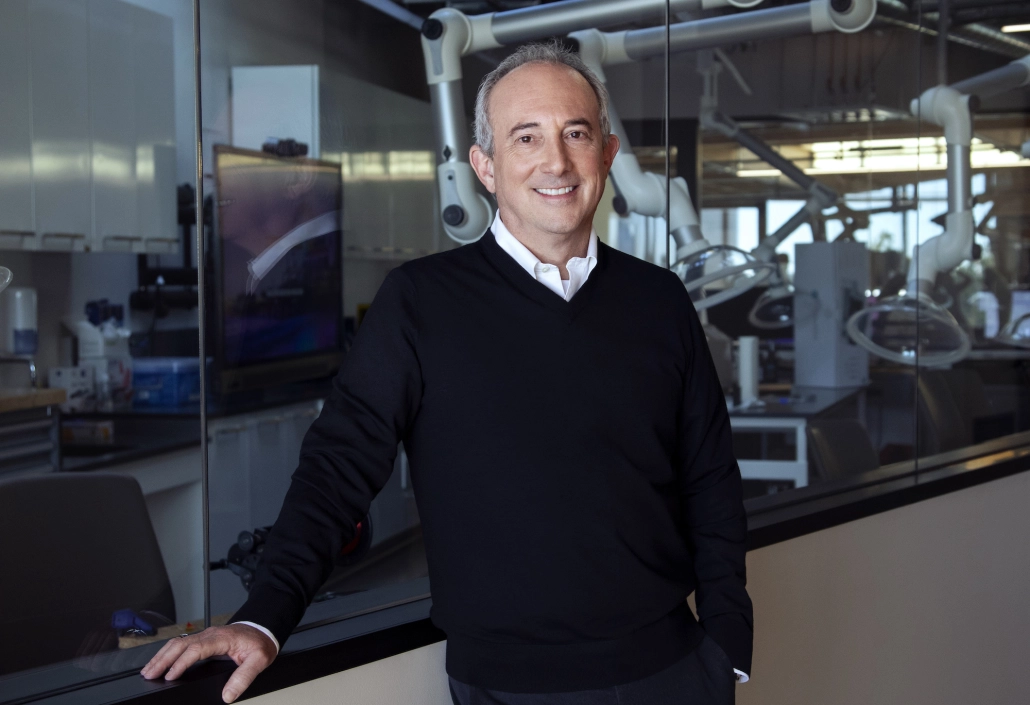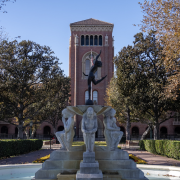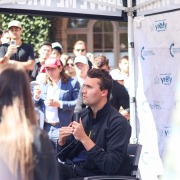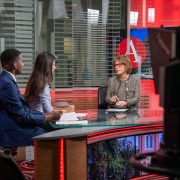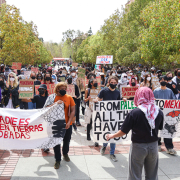Artificial intelligence has ushered in a new age of interdisciplinary work, revolutionizing the possibilities within science, business and even art. The study of technology’s cross-discipline capabilities, however, is nothing new.
World-renowned medical oncologist Dr. David Agus has been combining technology and medicine for decades now, and his research in artificial intelligence has already started to have profound effects in the world of medicine.
Daily headlines, sent straight to your inbox.
Subscribe to our newsletter to keep up with the latest at and around USC.
At USC, Agus is a professor of medicine and biomedical engineering and the founding director and CEO of the Ellison Institute of Technology. His innovative cancer research has earned him numerous awards, including the American Cancer Society Physician Research Award, a Clinical Scholar Award from the Sloan-Kettering Institute and the 2009 Geoffrey Beene Foundation’s Rock Stars of Science Award.
Early on in his career, Agus was drawn to oncology for the potential that the relatively new industry still held. As an undergraduate at Princeton University in the 1980s, he recalls telling his friend about his aspirations.
“[I said] I want to become a cancer doc,” Agus said. “[My friend] looked at me, and he goes, ‘Come on, David, you’re smart. Cancer doctors just give poisons to people. They don’t really work’ … To me, that doubled my resolve. I wanted to go into a field where they weren’t, not where they already were and they had answers. I wanted to go into a field that was just beginning.”
In a time when cancer doctors had limited treatment options for patients, Agus pioneered change in oncology by incorporating engineering and technology into medicine.
“He’s always been interested in integrating big data,” said Dr. Darryl Shibata, a clinical pathologist and professor of pathology at USC. “People still don’t know how to do that. They’re getting better at it, but from early on, he was very interested in integrating data. He’s taking big data and making it something more understandable and useful. I think it’s a modern way of doing research.”
Today, Agus is making an impact in another progressive industry: the world of artificial intelligence. Through his work at the Ellison Institute for Technology, founded in 2016, Agus and his AI research team have already begun to make breakthroughs in the use of artificial intelligence and medicine.
Utilizing technologies like deep learning, which trains computers to utilize neural networks much like human thinking, researchers at the EIT have found new, efficient ways to diagnose cancer. In 2020, researchers developed a deep learning algorithm that can classify breast cancer subtypes in tumor biopsies. In practice, this technology can diagnose cancer more efficiently and at a lower cost than the current technologies.
Agus said the effects of technologies like those being researched at the EIT will dramatically reduce costs, the greatest challenge facing the medical industry today.
“This will be accessible to everyone,” Agus said. “It’s not like it’s some fancy therapy that costs hundreds of thousands of dollars and only the elite hospitals can do. I do think it’s going to dramatically lessen the costs of developing drugs and the time to those drugs being developed, which in the end will translate to less spending in health care.”
Agus is also the author of three New York Times and international bestsellers: “The End of Illness” (2012), “A Short Guide to a Long Life” (2014) and “The Lucky Years: How to Thrive in a Brave New World of Health” (2016). These books explore simple changes in daily routines which can increase health and longevity.
His work in media extends also to television and social media. In December 2022, Paramount released “The Checkup with Dr. David Agus,” a show in which Agus discusses different medical issues with celebrity guests. In 2013, he gave a TED Talk titled “A new strategy in the war on cancer,” in which he detailed the power that big data and technology could have in transforming how we detect and treat cancer.
Across all of his work, Agus said he believes artificial intelligence will be the greatest modern transformation of the medical industry.
“This will be the most significant change in medicine in my lifetime,” he said. “The advances in care that will be around because of AI in the next several years will really transform how we treat patients.”
With AI’s potential to positively transform medicine, Xingyao Chen, an AI research engineer at EIT, said researchers at EIT still maintain caution and concern when it comes to the ethics of using AI.
“We’re always careful about not biasing our dataset, having good representation of multiple demographics,” said Chen. “ When our AI has a prediction about a patient’s outcome, we can say the AI made this decision: Why did it do this? What kind of information did it take in to make this decision? So those are failsafes to check whether the AI is being ethical or not.”
And despite AI’s superior ability at functions like interpreting big data, reading scans and individualizing treatment using large language models, Agus is confident AI will not replace humans.
“It’s not going to replace pathologists or radiologists, but it’s going to enable them to be more productive and to give better results,” he said. “You don’t just say you’ve got cancer of the lung or the prostate or the breast. You can actually say a lot more and say what the outcome is going to be, what drugs to use. It really will be the beginning of true personalized care in this country.”
AI’s future in medicine has not only made an impact on how scientists approach cancer research but also how students are studying the technology. Chen said the recent openings in AI internships have allowed for more young people to get hands-on AI research experience.
John Paine — a USC alum, former intern at EIT and current junior AI research engineer — said his experience researching AI at the Ellison Institute and working for Agus has allowed him to combine his academic interests into a holistic occupation.
“I was looking for a place that combined computer science and natural sciences,” he said. “We do a lot of really amazing stuff, and it’s just been a great opportunity to combine those two things I never thought I’d get to combine.”
That interdisciplinary approach helped propel Agus to success, as his early studies as an engineer helped lay the groundwork for his research in AI. For USC students and those looking to pursue a career in science, Agus urges young people to find what “the key really is to become facile in other disciplines.”
“Math and engineering are the foundation for what change will happen in medicine going forward, because we’re already learning biology and human physiology, and when you couple it together, that’s really powerful,” Agus said.
Agus’s philosophy of starting at a place where innovation has yet to happen is a key part to his success in transforming cancer treatment to become more efficient and effective. In his TED Talk discussing this cutting edge research, Agus said that he hoped “we would go from the art of medicine to the science of medicine.” Thanks to AI research, that aspiration is coming to fruition, he said.
“When I get a sample, and I have seen thousands of them, even though it said it was not aggressive cancer, it looks bad to me, and that pattern recognition enables the art of medicine,” he said. “The beauty is, AI can do art much better than humans can, much more reproducible. So that will be the transition to science we said that we were hoping and dreaming for. It’s finally here today.”
Correction: A previous version of this article misstated the Ellison Institute of Technology as the Ellison Institute of Transformative Medicine. The Ellison Institute was also founded 2016, not 2021. The Daily Trojan regrets these errors.

